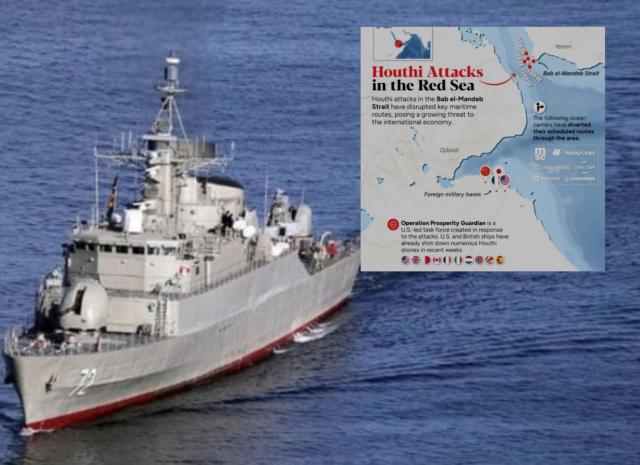According to the Israeli newspaper Globes, the United States' efforts to form the Prosperity Guardian force, aimed at ensuring safe maritime navigation in the pivotal Red Sea region, have been met with lukewarm responses from key European nations. This coalition, crucial for safeguarding crucial trade routes, has seen limited European engagement, raising concerns over the solidarity of Western alliances in critical global affairs.
Two weeks post its inception, the coalition's progress is sluggish, with only a handful of countries committing to participate. The extent of their involvement remains ambiguous, ranging from minimal liaison roles to potential deployment of military assets. Notably, major Red Sea bordering nations have abstained from joining, despite existing frameworks that involve them in regional maritime security.
Let’s get this straight: Maersk suspended shipping through the Red Sea, then the US formed an abomination of a coalition & Maersk agreed to return, a Maersk vassal heading to Israel was attacked by Yemen, then Maersk suspended shipping indefinitely, again. The coalition failed pic.twitter.com/uAecs76I01
— deeeeeee (@revolutionaryem) January 2, 2024
A significant factor hindering the coalition's expansion is the perceived association with Israel's operations in the Gaza Strip. This indirect linkage has deterred European countries, cautious of being seen as allies in Israel's military strategies.
European reticence is palpable. Spain, with its pro-Palestinian government, has openly refused to join the task force. France, upholding its independent defense policy, has limited its commitment to retaining national control over its naval assets. Italy, while bolstering another US-led maritime group, has distanced itself from the Prosperity Guardian. Even Germany, traditionally a staunch supporter of Israeli security, remains undecided, a stance that exposes the gap between diplomatic rhetoric and action, particularly in times of need.
i24NEWS Senior Editor @Guyaz reports an Israeli foreign ministry delegation traveled to Cairo last week to discuss the U.S.-led naval coalition against the Houthi attacks in the Red Sea. Egypt refused to take an active part in the coalition forces pic.twitter.com/avkDovA0A8
— i24NEWS English (@i24NEWS_EN) January 1, 2024
Israel's position in this scenario is complex. European promises of support, manifesting mainly in condemnations of Hamas and humanitarian aid pledges, fall short of the tangible military cooperation that such maritime security initiatives require. This cautious European approach reflects broader apprehensions about military engagements, influenced perhaps by past experiences in Afghanistan and Libya, and current priorities like guarding critical infrastructure in the Baltic Sea and managing Mediterranean migration.
The modest European response not only underscores a reluctance to be perceived as aligning with Israeli policies but also signals a broader weakness in Western unity. The Western alliance, known for its diverse and collective strength, appears fragmented in this context.
Meanwhile, the Red Sea remains a zone of escalating tensions, highlighted by recent incidents involving Houthi attacks on US Navy helicopters and a British naval ship. These developments underscore the strategic significance of the region, not just for the US and its closest allies like Britain, but also for Europe, given that a significant portion of its Asian trade traverses these waters.
America's pro-Israel stance has already made some of its European allies jittery, especially those who were supposed to be part of the Red Sea coalition. That does not bode well for assembling a coalition to rebuild postwar Gaza | Opinion | Solon Solomonhttps://t.co/u8D8SuScJ6
— Haaretz.com (@haaretzcom) January 1, 2024
The situation is a stark reminder of the shifting dynamics in global alliances and the importance of strong, unified responses to security challenges. For Israel, it reaffirms the critical nature of its alliance with the United States and, to a lesser extent, Britain, as pillars of support in an increasingly complex geopolitical landscape.


